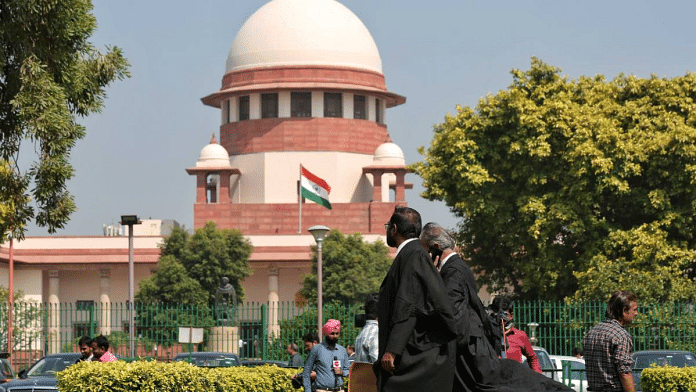New Delhi: The Supreme Court Tuesday ordered that the Enforcement Directorate (ED) should furnish grounds of arrest to the accused at the time of arrest. The court also observed that the federal agency “mandated with investigation of offence of money laundering and violations of foreign exchange laws” should not work clandestinely or be vindictive in its approach while conducting an investigation.
A three-judge bench led by Justice A.S. Bopanna said a person’s right to know the reasons for their arrest is a constitutional right under Article 22 (1) that enables them to take legal counsel. ThePrint has accessed the verdict.
Article 22(1) of the Constitution says, “No person who is arrested shall be detained in custody without being informed, as soon as may be, of the grounds for such arrest nor shall he be denied the right to consult, and to be defended by, a legal practitioner of his choice.”
The bench’s remarks on the ED come at a time when the apex court is seized of petitions seeking a review of its July 2022 judgment that upheld wide and sweeping powers entitled to the central agency under the Prevention of Money Laundering Act (PMLA).
In July last year, a two-judge bench led by Justice A.M. Khanwilkar (now retired) had upheld the stringent PMLA, including the provision under which the ED can arrest an individual on the basis of an ECIR (Enforcement Case Information Report) without informing them of its contents.
The top court’s present order came while granting bail to two directors of real-estate firm M3M — Pankaj and Basant Bansal — who were summoned on 14 June for questioning in an alleged money laundering case. They were arrested in another ED case registered the same day, as was widely reported in the media.
The duo moved the Supreme Court challenging their arrest and the Punjab and Haryana High Court order that refused to give them relief.
Asking the federal anti-money laundering agency to maintain stringent standards of probity, fairness and not be vindictive in its functioning, the bench said the present case “speaks volumes about the ED and reflects poorly on their style of functioning, especially since the agency is charged with preserving the financial security of the country”.
As an agency entrusted with such high powers and functions, the bench said it is expected to be “transparent, above board and conform to pristine standards of fairness and probity and not be vindictive in its stand”.
The present case
The directive to the ED to supply grounds of arrest to the accused was made after the court “realised” that there was lack of consistent and uniform practice on this front.
The ED has accused the Bansals of diverting Rs 400 crore through shell companies. Further inquiry allegedly disclosed that the two, along with another realty group, tried to tamper with the trial court proceedings by indirectly bribing special judge Sudhir Parmar in Panchkula. The judge was suspended from service on 27 April.
The SC bench ordered their immediate release, as it commented on the manner in which the ED probed the case and took serious exception to the agency officer orally informing the grounds of arrest to the accused. No written copies of the grounds were supplied to the accused, according to the submission made by the accused.
In the absence of written grounds of arrest, the court said it will “boil down to the word of the ED against the accused”.
“The ED’s investigating officer merely read out the grounds of arrest. This does not fulfill the mandate of Article 22(1) of Constitution and Section 19(1) of the PMLA. The clandestine conduct of the ED in proceedings against the accused does not commend satisfaction as it reeks of arbitrariness,” the court said.
Section 19(1) gives authorised officials, such as the director, deputy director, or assistant director, the power to arrest persons suspected of committing offenses under PMLA if they have sufficient reason to believe that the individual has committed an offense.
The bench noted the argument made by the Bansals and said the ED needs to follow the procedure laid down in Section 167 of the Criminal Procedure Code (CrPc) while seeking custody following the arrest. Section 167 prescribes the procedure to be followed when investigation cannot be completed in 24 hours.
(Edited by Smriti Sinha)
Also read: SC calls for re-issue of Aadhaar to ‘genuine citizens’ who lost documents in Manipur violence



